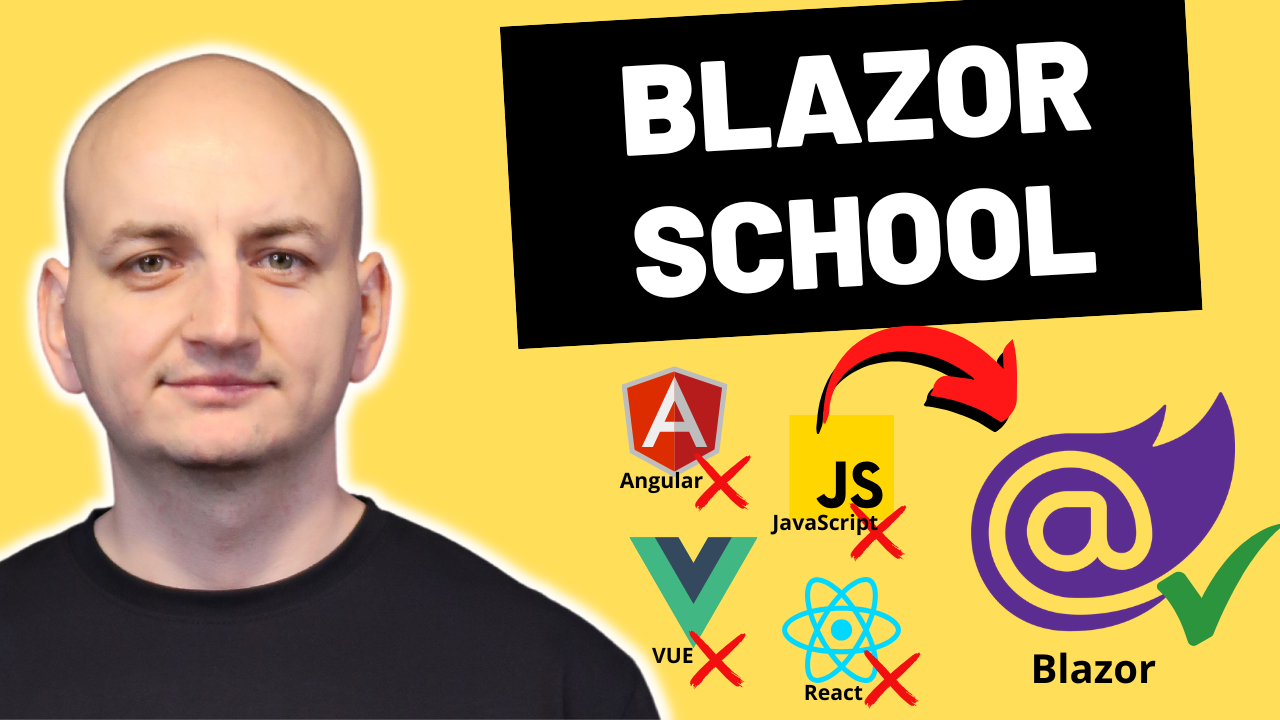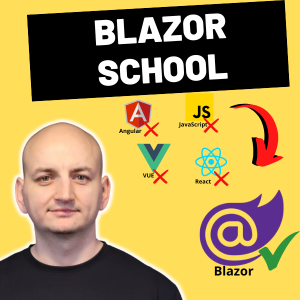Recently, I have been helping many people who want to become programmers learn programming. During this time, I have noticed many mistakes that these people often make. In this article, I wanted to share with you the 19 most common mistakes in learning programming that are worth avoiding. If you are just starting to learn programming and want to become a programmer, then you should definitely read this article to the end. The order in which I will present them is random.
Mistake 1. Spending too much time choosing a programming language
I once wrote an entire article on this topic. If you want to start learning programming, choose any programming language. I know a lot of people who spend months choosing the right language and wondering which one is the best and over time they lose motivation to learn. There is no such thing as the best language, each of them can simply be better in a different situation. If you want to learn programming to find a good job, then of course I recommend C# the most, but you can also choose Java, JavaScript, PHP, Go or Python, it doesn't matter much at this stage. If in the future you need to change the language, it will be much easier for you if you already know another one. So choose any language and start programming.
Mistake 2. Learning several programming languages at the same time
This is somewhat related to the previous point. Sometimes people write to me who claim to know Php, Java, JavaScript and C# at the same time and I can't find a job. If you are a beginner and think you know so many languages, then you probably don't know any of them well. Focus on 1 programming language well at first. Start by learning the syntax, over time start writing simple applications, and later more advanced ones. If you learn several languages at the same time, their syntax may get confused later. As I mentioned earlier, you won't have time to learn each of them at a good level. At most, you will only know some basics, and to find a job, you need to have a bit more extensive knowledge. The company you will work for will probably expect you to know only one language, so there is no need to spend time learning several.
Mistake 3. Focusing too much on choosing an IDE
This may seem trivial, but I also often come across people who are just starting to learn, spending many hours choosing the right programming environment. Here, depending on the language, these are different environments, but for example, C# programmers wonder whether it is better to choose Visual Studio, or maybe Visual Studio Code, maybe Rider. Once they make a choice, they wonder about further extensions, colors, add-ons, and in reality it does not matter too much. At the beginning, it is worth choosing 1 environment. For C# programmers, it can definitely be Visual Studio and programming in it. The longer you work in one environment, the more efficient it will be. It is worth slowly learning some keyboard shortcuts, so that programming is simply more convenient for you. It does not matter whether you use the light or dark theme, just program.
Mistake 4. Constantly learning theory, too little practice
You can read many books, many blog articles, but if you do not start practicing the knowledge you have learned, this knowledge will escape you. In my opinion, the best way is to use it in practice after learning a given topic. If you read in a book, for example, how to write unit tests, then spend some time writing these tests. If you learn from online courses, then the same, immediately after learning the theory, try to use it in practice. You saw how to generate PDF, create a new project and try to implement it in your application.
Mistake 5. Not creating your own applications
I always say that the best way to learn is to create your own applications. It is clear that when you start learning, such applications will not be very extensive, but you have to start somewhere. At the beginning, you can write small applications, and over time, as your knowledge grows, the applications will also have more functionalities. They will adhere to better principles and, above all, you will consolidate the knowledge you have learned. In addition, thanks to this, you can also build your portfolio or brag to your future employer at a job interview. In such a situation, your chances of finding a job will definitely increase.
Mistake 6. Learning programming by heart
I once made this mistake myself, when I started my adventure with learning programming. I thought that I had to know the entire syntax, various methods, classes, method parameters, or return types by heart. Nothing could be further from the truth, you should never learn programming by heart. It is enough to know or understand how something is supposed to work and why, but it is not worth learning everything by heart. If you need to use an external library, call some methods that you rarely use, then you can easily look for information, preferably from the documentation on how it should look like, and not learn it by heart.
Mistake 7. Copying solutions without going into details
It may happen, especially at the beginning of learning, that you will have some problem that you cannot cope with. In such situations, you will look for information on the Internet. Maybe you will find some solution on a forum, some sample code that you will use in your application. However, if you are already copying someone else's code, then definitely try to go into details. See what exactly this code does. Understand why your previous solution did not work, and this one does. Thanks to this, you will develop much faster. I know people who simply copy a given solution from some portal and still do not know where the error was before. Why the application did not work correctly before, and now it works. They are only interested in the fact that the error has been fixed, but it does not matter how. This is a bad approach in my opinion, it is worth spending more time and delving into the problem, thanks to this you will develop much faster and most importantly you will probably not make a similar mistake in the future.
Mistake 8. Poor ability to debug code
Another error that I often encounter. People often write to me who have a simple error in their application and cannot diagnose it. Usually, thanks to good use of the debugger in such a situation, finding the error takes literally a few minutes. In your work, you will certainly often have to look for some errors in various applications and without understanding how the debugger works, it will be very difficult for you.
Mistake 9. Not asking questions
If you have a problem that you cannot solve for a longer period of time, do not be afraid to seek help from other people. Similarly, if you do not understand a given issue, try to ask, if possible, your programmer friend, or maybe on some forum for an explanation. It often turns out that the person has had a similar problem before and will be happy to help you. The fact that you ask questions does not mean that you are bad, you are just starting to learn, so it is obvious that you will not know everything yet. Of course, you cannot exaggerate here either, do not ask about every trivial thing. If it takes you a few minutes to find a solution in a search engine, then of course start with that.
Mistake 10. Lack of patience in learning
Learning programming is not a sprint, but more of a marathon. You won't learn programming in a few days or even weeks. If you're starting from scratch, you have to spend at least a few months learning. Programming isn't always easy. Sometimes you may not understand everything right away, but over time, as you learn more and more topics, programming will become more understandable to you. It's important to be patient at the beginning and not get discouraged by possible failures. I admit that I had such doubts at the beginning of my journey, when I had problems understanding some basic issues, but over time, with further learning, everything became more understandable.
Mistake 11. Lack of systematic learning
If you want to become a programmer, don't postpone your dreams. If you start learning and have the opportunity, try to learn systematically. You can assume that you will spend x hours a week or every day learning programming and stick to these assumptions. Systematic learning will bring you the most benefits. It is not worth taking a few month breaks, if, for example, you lose motivation to learn. Returning to learning after such a break is quite difficult.
Mistake 12. Not using your previous projects
Another advantage of creating your own projects is the ability to use code that you have already written. The more projects you have, the easier it will be for you to program in the future in subsequent projects. If you have already written code for sending emails, for example, then if you need to implement it in another project again, you already have the code ready to use. It is worth creating your own repository, it can be as private as possible, where you will store your projects. You will definitely be able to use some of the code again in the future.
Mistake 13. Lack of learning goal
It is always worth having some learning goal. Then not only do we have more motivation and willingness to learn, but we actually focus on this goal and do everything to strive for it. If you are just starting to learn now, your first goal will probably be to find your first job as a programmer. For example, you can assume that in half a year, it can also be earlier, no matter what happens and at what stage of learning you are, you will send several CVs to different companies to verify your skills. You will definitely have more motivation to learn then. Of course, you can have a different goal, e.g. your first goal may be to write your first web application, or desktop application, whatever is important, to set a date and do everything to achieve this goal.
Mistake 14. Not taking breaks during your studies
Here I mean breaks during the day. If you have planned several hours during the day to learn programming, remember not to sit in front of the computer for several hours straight. Such learning may be less effective. It is worth taking a short break every now and then, thanks to which this knowledge will be better absorbed. Your body also needs rest. For example, you can spend 30 minutes studying, then take at least a 5-minute break and go back to studying. During the break, it is best to step away from the computer. When you come back, study for 30 minutes again, take a 5-minute break. If you feel more tired, you can extend the break.
Mistake 15. Too critical a look at your knowledge
Some people also happen to spend a lot of time learning programming, but still think that their knowledge is still too little to become a programmer. Remember that the best verification of your skills is a job interview and it is worth sending your CV, because you will gain new experiences from each job interview. You will eventually see what you are still lacking and what you should focus on to get a job offer at the next interview. Obviously, if you are looking for your first job, you may still have some gaps, but you don't have to know everything to get your first job. What's more, even if you have a few years of experience as a programmer, you still won't know everything. A programmer learns throughout their career, and you will develop your skills the fastest in this position.
Mistake 16. Thinking we know everything
This is a bit of the opposite of the previous point. An overly critical view of your skills is not good, but you also can't think that you already know everything. Especially since if you start thinking like that, you will stop developing. As I mentioned, a programmer learns throughout their career. Usually, it is like this, and it doesn't matter what we learn, it is the same in every field, that at some point we start to think that we already know everything in this particular topic. Only later, with time, do we start to see our shortcomings and actually realize that it was not quite like that. It is always worth listening to the advice of others, especially more experienced colleagues. Do not close yourself off to new knowledge and develop yourself all the time.
Mistake 17. Lack of ability to search for appropriate information
A programmer must be able to solve various problems in their work. Especially at the beginning of your career or education, you will encounter various problems for the first time. In such situations, you must be able to search for appropriate information on the Internet. It is usually worth looking for information on various forums or websites, in books, courses, blogs, but above all it is also worth reading documentation. You have to constantly develop this skill, because both when learning programming and at work, you will often have to do research on a given topic, so it is worth doing it well. Here, too, knowledge of English can be useful, because you will find the most content in this language.
Mistake 18. Getting distracted while studying
If you are studying at home, it is worth finding a place where no one will distract you. Learning to program definitely requires you to focus, so pay attention to all distractions. Ask your household members not to interrupt you while studying. Silence your phone, do not check social media, do not check your email and, ideally, turn off all notifications. If you get distracted, it will be hard to get back to studying later. If you plan to spend an hour studying, make the most of it. Sometimes you can use an hour of concentration better than several hours where someone is constantly distracting you from studying.
Mistake 19. Not enjoying learning
Finally, remember that learning to program should be fun. Try to learn the way you like best. If you want to learn from YouTube videos, watch videos and try to practice. Similarly, if you prefer online courses, buy a course and learn from it. If you prefer to learn from books, then learn from books. If you want to write an application right away, then try. Set yourself increasingly ambitious goals. If learning programming is not fun for you, you will give up after a few weeks, so try to enjoy it, because programming, at least in my opinion, is really great.
SUMMARY
These were the 19 most common mistakes in learning programming, which are often made by people who want to become programmers. I try to sensitize all participants of my Become a .NET Programmer training, in which I teach programming in C# on the .NET platform from scratch, to many of these mistakes. If you are interested in learning programming under my supervision, I also invite you to join. Link to registration: BecomeSoftwareDeveloper.com.
If you liked this article, be sure to join my community. Sign up for the free newsletter, where every week I share valuable materials, especially regarding C# and the .NET platform (free subscription - newsletter).



